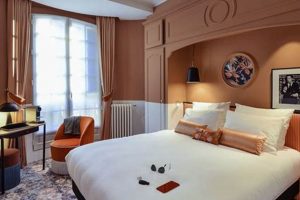The term identifies a lodging establishment situated in proximity to a major transportation hub in Paris. Specifically, it references accommodation near the Gare de Lyon railway station and formerly, the location of the Bastille station. The nomenclature reflects a connection to these historical or present-day transit points, often suggesting ease of access for travelers.
Proximity to significant transport infrastructure offers numerous advantages. It simplifies arrival and departure logistics for visitors, reducing travel time and associated stress. Moreover, such locations frequently provide access to diverse amenities, including restaurants, shops, and cultural attractions. Historically, areas surrounding railway stations have been vital commercial and social centers, contributing to the vibrancy of the local area.
The subsequent discussion will delve into specific examples of these establishments, exploring their architectural characteristics, service offerings, and the surrounding neighborhood’s appeal to prospective guests. This exploration will highlight how such locations contribute to the overall Parisian experience for tourists and business travelers alike.
Selecting accommodation in this sector of Paris requires careful consideration to optimize convenience and overall experience. The following guidelines provide essential information for prospective visitors.
Tip 1: Prioritize Transportation Access. Evaluate the precise distance and ease of access to Gare de Lyon and related metro lines. Direct walking access, or minimal transfers, significantly enhances convenience for travelers arriving or departing by train.
Tip 2: Research Neighborhood Characteristics. The area surrounding the Gare de Lyon and the Bastille district exhibit distinct features. Consider factors such as the availability of restaurants, the level of nighttime activity, and proximity to desired attractions.
Tip 3: Examine Room Amenities. Assess the availability of essential amenities, including reliable Wi-Fi, air conditioning (particularly during warmer months), and soundproofing, given the potential for noise from the nearby transport hub.
Tip 4: Investigate Security Measures. Verify that the selected establishment employs adequate security protocols, including secure entry systems and surveillance, to ensure a safe and comfortable stay.
Tip 5: Evaluate Reviews and Ratings. Consult online reviews and ratings from previous guests to gain insights into the quality of service, cleanliness, and overall satisfaction levels. Pay attention to recurring themes or concerns.
Tip 6: Consider Luggage Storage Facilities. If arriving before check-in time or departing after check-out, confirm the availability of secure luggage storage options to avoid the inconvenience of carrying luggage throughout the day.
Tip 7: Inquire About Airport Transfer Options. Determine if the establishment offers or can arrange reliable airport transfer services. This can simplify the journey to and from Charles de Gaulle (CDG) or Orly (ORY) airports.
Careful consideration of these points will contribute significantly to a satisfactory and efficient stay in the vicinity of the Gare de Lyon and Bastille, ensuring a positive overall travel experience.
The subsequent section will provide a comparative analysis of specific lodging options within this locale, further assisting in the selection process.
1. Proximity
Proximity is a defining characteristic of establishments marketed as “gare de lyon bastille hotel”. It directly influences their appeal to travelers prioritizing efficient transit. The shorter the distance between the lodging and Gare de Lyon, or key metro lines connecting to Bastille, the greater the convenience for those relying on train or subway transportation. This proximity translates to reduced travel time, minimized reliance on taxis or ride-sharing services, and enhanced overall travel ease. For example, a traveler arriving late at night at Gare de Lyon may prefer a hotel within immediate walking distance, even if it means sacrificing certain amenities or features found at a more distant location.
The impact of proximity extends beyond mere convenience. It affects the traveler’s overall impression of Paris. Seamless transfer from train to accommodation can significantly reduce stress, allowing visitors to begin their experience positively. Conversely, a difficult or lengthy journey to the lodging, especially after a long trip, can negatively impact their perception. Hotels consciously leverage proximity in their marketing, emphasizing walking times and direct access to transportation hubs. This allows them to position themselves advantageously in the competitive Parisian hospitality market.
However, proximity also presents challenges. Establishments very close to major transportation hubs may experience higher levels of noise and activity. Furthermore, the immediate vicinity might lack the charm and character found in more residential areas. Consequently, successful establishments balance proximity with effective noise mitigation strategies and strive to create a welcoming atmosphere despite the bustling surroundings. Understanding the inherent trade-offs associated with proximity is essential when evaluating options within this category of Parisian lodging.
2. Amenities
Amenities represent a critical factor in the selection of accommodation, particularly when considering establishments marketed under the banner of gare de lyon bastille hotel. Beyond mere proximity, the quality and availability of amenities significantly influence a traveler’s comfort, convenience, and overall satisfaction. Establishments near major transport hubs cater to a diverse clientele, including business travelers and tourists, each with distinct needs and expectations regarding available services and features.
- Wi-Fi Access
Reliable and high-speed internet access is paramount for both business and leisure travelers. It enables connectivity for work, communication, entertainment, and accessing travel information. Establishments offering complimentary Wi-Fi often attract a larger clientele, especially those requiring uninterrupted online access. The quality of Wi-Fi service directly impacts guest satisfaction and influences online reviews and recommendations.
- Breakfast Service
The availability and quality of breakfast service significantly contribute to a convenient and satisfying stay. Complimentary breakfast, particularly buffet-style, saves time and reduces the need to search for external dining options, especially for travelers with early departures or tight schedules. The variety and quality of breakfast offerings influence guest perception and overall value assessment.
- Room Comfort Features
Room comfort features, including air conditioning, soundproofing, and comfortable bedding, directly impact the quality of rest and relaxation. Air conditioning is essential during warmer months, while soundproofing mitigates noise from the bustling surroundings. Comfortable bedding ensures restful sleep, crucial for travelers adjusting to new time zones or recovering from travel fatigue. These elements contribute significantly to a guest’s well-being and overall experience.
- Business Facilities
For business travelers, access to business facilities, such as meeting rooms, printing services, and work desks, is highly valued. These amenities facilitate productivity and enable travelers to conduct business effectively while away from their offices. The availability of these facilities often differentiates establishments catering to business clientele from those primarily focused on leisure travelers.
The collective impact of available amenities on the overall guest experience reinforces their importance in the selection process. Prospective guests should carefully evaluate the amenities offered by establishments near Gare de Lyon and Bastille, aligning their choices with individual needs and preferences. This evaluation, in conjunction with proximity considerations, facilitates a well-informed decision, ultimately contributing to a more satisfying and efficient stay in Paris.
3. Accessibility
Accessibility is a critical consideration for establishments identified as “gare de lyon bastille hotel,” primarily due to their location within a major transportation hub and a historically significant area. The term encompasses not only physical access to the premises for individuals with mobility challenges but also the ease with which guests can reach various parts of Paris and its surrounding regions. Proximity to the Gare de Lyon, a major railway station, inherently suggests a high degree of accessibility to national and international rail networks. However, the value proposition extends to encompass connections to the Parisian metro system, bus lines, and other forms of public transportation.
For example, a hotel directly connected to the Gare de Lyon via an underground passage or a dedicated shuttle service offers superior accessibility compared to one requiring a lengthy walk or multiple transfers. This direct access reduces travel time and mitigates the potential for delays or difficulties navigating unfamiliar surroundings, particularly for travelers with heavy luggage or mobility impairments. Similarly, the Bastille area, while not directly served by the Gare de Lyon, benefits from extensive metro connections, allowing guests to easily access attractions such as the Place de la Bastille, the Marais district, and other key locations. Therefore, accessibility in this context is not solely defined by proximity to the railway station but also by the breadth and efficiency of connections to the broader Parisian transportation network.
In conclusion, accessibility serves as a primary determinant of value for establishments located near the Gare de Lyon and Bastille. It influences not only the ease of arrival and departure but also the overall convenience and efficiency of exploring Paris. Challenges remain in ensuring universal accessibility for all guests, particularly in older buildings, but the ongoing efforts to improve transportation infrastructure and adapt lodging facilities are gradually enhancing the overall travel experience. Understanding the multifaceted nature of accessibility is essential for both hoteliers and travelers seeking to optimize their experience in this vibrant area of Paris.
4. Pricing
Pricing, in relation to establishments identified as “gare de lyon bastille hotel,” is a critical determinant of value and competitiveness within the Parisian hospitality market. The proximity to a major transportation hub, the Gare de Lyon, and the historical significance of the Bastille district create a high-demand environment that directly influences pricing strategies. Consequently, establishments leverage their location, amenities, and perceived service quality to justify specific price points. For example, a hotel offering direct access to the Gare de Lyon and featuring premium amenities like a spa or rooftop terrace is likely to command higher prices than a more basic establishment located a few blocks further away. Fluctuations in demand, driven by seasonal tourism or special events, further impact pricing, with rates typically increasing during peak periods. Understanding these dynamics is crucial for prospective guests seeking to optimize their lodging budget and for hoteliers aiming to maintain occupancy rates while maximizing revenue.
The competitive landscape surrounding the Gare de Lyon and Bastille necessitates a nuanced pricing approach. Establishments must carefully balance their rates against those of comparable properties in the vicinity, considering factors such as room size, included services (e.g., breakfast, Wi-Fi), and overall ambiance. Online travel agencies (OTAs) play a significant role in shaping pricing perceptions, as they provide a platform for comparing rates across multiple properties. Hoteliers often adjust their pricing in response to competitor actions or changes in market demand, employing dynamic pricing models to optimize revenue management. Moreover, customer reviews and ratings influence pricing indirectly, as establishments with consistently positive feedback are often able to command premium rates. The interplay of these factors creates a complex pricing ecosystem that requires careful monitoring and strategic adaptation.
In conclusion, pricing serves as a pivotal element in the value proposition of a “gare de lyon bastille hotel.” The confluence of location, amenities, market demand, and competitive pressures shapes the pricing landscape, requiring both guests and hoteliers to engage in informed decision-making. While proximity to transportation hubs and desirable amenities can justify higher price points, prospective guests must carefully weigh their options and consider alternative locations or less luxurious accommodations to optimize their lodging budget. Effective revenue management strategies are essential for hoteliers seeking to maintain profitability and competitiveness within this dynamic segment of the Parisian hospitality market.
5. Reputation
The reputation of an establishment designated as “gare de lyon bastille hotel” directly influences its occupancy rates, revenue, and long-term viability. Positive reputation, cultivated through consistent service quality, favorable guest experiences, and effective management of online reviews, serves as a crucial differentiator in a competitive market. A negative reputation, conversely, can lead to decreased bookings and necessitate extensive remediation efforts to regain customer trust. Cause and effect are evident: positive guest experiences, objectively documented, translate to higher ratings, increased visibility on booking platforms, and, ultimately, improved financial performance. For example, an establishment consistently praised for its cleanliness, helpful staff, and proximity to transportation will demonstrably outperform a similar property with recurring complaints regarding noise, inadequate service, or misrepresented location.
The practical significance of understanding the link between reputation and business success lies in proactive reputation management. This encompasses not only maintaining high standards of service but also actively monitoring and responding to online reviews and feedback. Addressing negative comments promptly and professionally, implementing corrective measures to prevent recurrence, and soliciting positive reviews from satisfied guests are essential components of a comprehensive reputation management strategy. Consider the scenario of a newly opened “gare de lyon bastille hotel.” Initial reviews mentioning slow check-in procedures can be addressed by optimizing staffing levels or streamlining the registration process. Failure to address these early issues can lead to a cascade of negative reviews, damaging the hotel’s reputation and hindering its ability to attract future bookings. Therefore, continuous monitoring and proactive intervention are vital for sustaining a favorable reputation.
In summary, the reputation of a “gare de lyon bastille hotel” is inextricably linked to its financial performance and long-term sustainability. Cultivating a positive reputation requires a commitment to consistent service quality, proactive reputation management, and a willingness to adapt to evolving customer expectations. Challenges remain in mitigating the impact of fabricated or malicious reviews, but the fundamental principle remains: consistently exceeding customer expectations is the most effective means of building and maintaining a strong and positive reputation in a competitive market.
Frequently Asked Questions
This section addresses common inquiries regarding lodging options in the vicinity of Gare de Lyon and the Bastille area of Paris, providing clarity and essential information for prospective guests.
Question 1: What defines a “gare de lyon bastille hotel”?
The term typically refers to accommodations located within a reasonable proximity to the Gare de Lyon railway station and/or the Bastille district. The designation highlights convenient access to transportation hubs and local attractions.
Question 2: How does proximity to Gare de Lyon affect the hotel experience?
Closer proximity to the station generally translates to reduced travel time upon arrival or departure, easing logistical burdens. However, it might also result in increased noise levels, requiring consideration of soundproofing and other mitigating factors.
Question 3: Are there specific amenities tailored for travelers using Gare de Lyon?
Some establishments offer services such as early breakfast options, luggage storage, and airport shuttle arrangements to cater specifically to travelers arriving or departing via the railway station. Inquire directly about these specialized services.
Question 4: What is the typical price range for accommodations near Gare de Lyon and Bastille?
Pricing varies significantly depending on factors such as hotel class, room size, amenities, and seasonal demand. Expect higher prices for luxury establishments with extensive services and prime locations, with more budget-friendly options further from the station.
Question 5: How can potential noise from Gare de Lyon be mitigated?
Soundproof windows and walls are crucial features. Inquire about these elements when booking. Furthermore, request a room on a higher floor or away from the station-facing side to minimize noise intrusion.
Question 6: What are the alternative transportation options available from establishments near Gare de Lyon?
In addition to train travel, establishments in this area provide access to metro lines, bus routes, and taxi services. Explore these options to efficiently navigate Paris and its surrounding regions.
In summary, lodging near Gare de Lyon and Bastille presents a range of options, balancing convenience with factors such as noise levels and pricing. Thorough research and careful consideration of individual needs are essential for a satisfactory stay.
The following section will offer actionable tips for securing the optimal “gare de lyon bastille hotel” for a specific travel itinerary.
Conclusion
The preceding analysis has explored the key considerations for evaluating establishments identified as “gare de lyon bastille hotel.” Proximity, amenities, accessibility, pricing, and reputation each contribute significantly to the overall value proposition. Careful assessment of these factors allows travelers to make informed decisions, aligning their lodging choice with specific needs and preferences.
The ongoing evolution of the Parisian hospitality market necessitates continuous adaptation from both travelers and hoteliers. Future success hinges on leveraging technological advancements, embracing sustainable practices, and prioritizing customer satisfaction. The enduring allure of the Gare de Lyon and Bastille districts ensures a continued demand for quality accommodation. Diligent research and judicious decision-making will remain essential for optimizing the travel experience in this dynamic locale.







